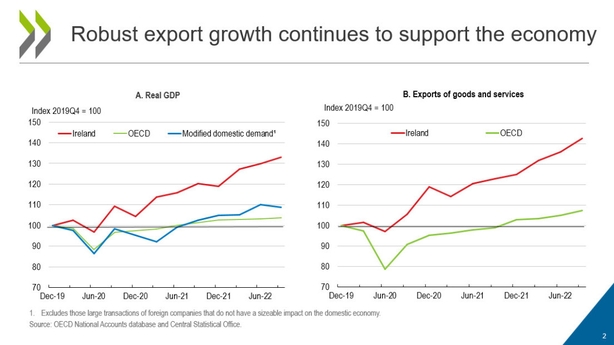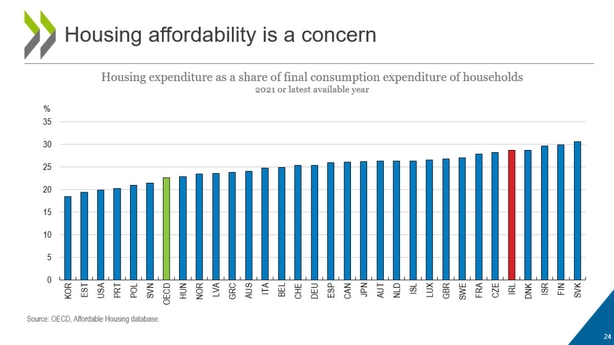The OECD, the Paris-based think tank, says the Irish economy is "coping well" with the repercussions from Russia's war against Ukraine.
In an economic survey published today, it also says high inflation and low business and consumer confidence will lower demand in the economy.
It expects growth to continue in the multinational sector, but "at a decelerating rate".

The OECD forecasts that modified domestic demand, which measures activity in the domestic economy, will grow by 8% this year before slowing to just 0.9% next year.
It predicts that inflation this year will average 8.4% before moderating slightly next year to 7.2% and slowing to 2.4% in 2024.
Unemployment will remain low, going from 4.7% this year to 5.3% next year.
The think tank also says fiscal policy, which is the amount governments collect and spend, has had enough room to respond "forcefully" to both the Covid crisis and the fallout from the war.
However, it says fiscal policy is now facing "a number of pressures in the short run and on its long-term sustainability".
It observes that high inflation is putting pressure on the Government to increase spending but it warns this risks undermining the new spending rule.
It also suggests the Government should consider putting the spending rule into law.
The OECD warns that additional spending to support demand "should be avoided in the current context of high inflation".
Any additional support for vulnerable households should be "temporary and targeted" and designed "to maintain incentives for energy savings," it adds.
It says the implications for corporate taxation here from the agreement brokered by the OECD last year "are very uncertain".
In the longer term, it points out climate change targets will require Government support over the coming decades and a more rapidly ageing population will push up health and pension costs.
Noting the problems of housing affordability, it suggests that a special division be established in the High Court to deal with planning reviews and challenges.

It says health gains "have been impressive" over recent decades with life expectancy now amongst the best in the OECD.
It now ranks healthcare spending in Ireland as "high" compared to other countries but also describes pay as "high" and that "pharmaceutical spending does not make the most of low-cost alternatives."
We need your consent to load this rte-player contentWe use rte-player to manage extra content that can set cookies on your device and collect data about your activity. Please review their details and accept them to load the content.Manage Preferences
The OECD also says that spending on long-term care is already "elevated" and that "efficiency gains" will be important in addressing the pressures facing the healthcare system, particularly as the population ages.
On climate action, the OECD says major investment will be required to make the national electricity capable of taking on more renewable energy.
It recommends "as a matter of urgency" that the planning process be "expedited" to "reduce uncertainty concerning major investments in wind turbine capacity".
It says greater efforts will be required in agriculture to bring down emissions otherwise the overall cost of reducing greenhouse gas emissions will go up substantially.
It suggests bringing in a pricing mechanism for methane emissions similar to what exists for carbon.

Regarding today's OECD economic report on Ireland, the Minister for Finance Paschal Donohoe said the organisation's view is broadly consistent with the Government's view of how the Irish economy will perform in the time ahead.
"Despite everything we think for this year we're going to have another strong year of economic growth, and indeed, employment growth," he said.
"But as we move into next year, we do, for reasons that are beyond our control, expect to see that performance subdue."
"It is however, still pointing to a really high level of employment within our economy and a change in growth, which based on our current forecasts for next year, will be a moderation in growth as opposed to anything darker for now."
On the OECD's call for the Government to keep a lid on spending in the face of inflation, Mr Donohoe said the Irish Fiscal Advisory Council had found the intervention measures in the budget had been broadly right.
"And what we'll have to do when we move into next year is evaluate where we stand and if or what kind of further help is needed," he said.
"It's very difficult to evaluate where we'll be with the level of inflation for next year, and at that point we'll make a call and make an evaluation as to whether further help is needed."
On the need for planning reform highlighted in the OECD report, Mr Donohoe said he is absolutely confident that the Government is going to be able to make significant and positive changes to the planning systems and law.
He said it is inevitable that when a major piece of reform is proposed that there are differing reactions to it.
"I'm very supportive of the kind of change that is needed," he said.
"But we have legislation that will begin pre-legislative scrutiny and I know will undergo significant debate and evaluation within the Oireachtas."
"And I'm confident that when that is done in the early part of next year, we will emerge with legislation and with change that will recognise the democratic rights of communities and will continue to recognise the role they have to play in our planning system but will also bring the kind of clarity and certainty to our planning system that is needed to allow us to build more homes."
In relation to the OECD's call for the Government to revisit its decision on the state pension age, Mr Donohoe said the Government has already made its decision in relation to that.
"And what we will have to do and are committed to doing is finding alternative ways to address the sustainability of our pension system and our public finances," Mr Donohoe said.
"So the next step for us with regard to that is reaching a decision regarding the right level of PRSI within our tax code and within our economy and we believe that is a different and as effective a way of addressing the sustainability of our pension system."
Pandemic has not left too many scars on Ireland
The OECD's Deputy Director of Country Studies Vincent Koen said the pandemic has not left too many scars on Ireland, adding that the country "has really done a very good job in dealing with these shocks".
We need your consent to load this rte-player contentWe use rte-player to manage extra content that can set cookies on your device and collect data about your activity. Please review their details and accept them to load the content.Manage Preferences
Mr Koen applauded Ireland setting aside money into the national reserve fund and introducing the 5% spending rule.
"Fiscal prudence is really important also because there are a number of pressures down the line with the society ageing more rapidly than most OECD countries and therefore health and pension expenditure is bound to go up," he said.
Speaking on RTÉ's News at One, Mr Koen said addressing housing supply must be a priority to avoid housing prices or affordability "getting worse".
"Demand focused measures to assist first home buyers are indeed fuelling demand which is already exceeding supply. We need to add more funds but we need to prioritise supply if you want to avoid housing prices going up further or housing affordability problems getting worse," he said.
He said Ireland's planning process is "overly complicated" and should be "streamlined".
"We believe it is overly complicated and makes for very significant delays where there shouldn’t be such long delays. So there is definitely a need to streamline," the OECD Deputy Director of Country Studies said.
"How exactly the nitty-gritty of such streamlining would need to take place, we are not the experts. But we observe from a comparative international standpoint this is one of the bottlenecks in the Irish set up," he added.






